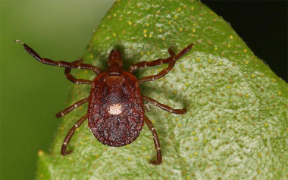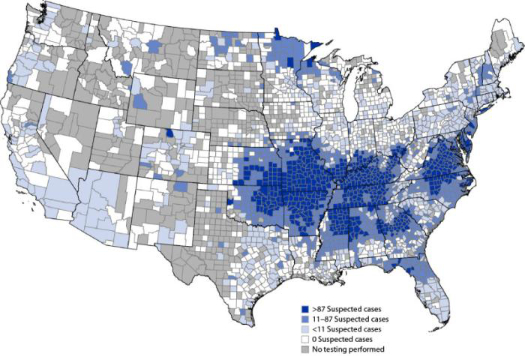By Linda Geist
MEXICO, Mo. – Life changed dramatically for Ted DeVault of Mexico, Mo., in 2023, when he was diagnosed with alpha-gal syndrome, a serious allergic condition triggered by the lone star tick, which is common in Missouri.
After multiple life-threatening emergency room visits, he began losing his vision and seeing double. Then the longtime Audrain and Monroe County livestock and grain farmer began an exhaustive search for answers at leading medical facilities in and out of Missouri.

Ted DeVault, a longtime Audrain and Monroe County livestock and grain farmer, and his family had to make major adjustments in their diet and lifestyle after he was diagnosed with alpha-gal syndrome, a condition whose symptoms include an allergy to red meat. Photo courtesy of Ted DeVault.
DeVault’s frustration and search for more information was not unusual. A recent survey by University of Missouri Extension on the experiences of those with AGS and those who support them showed that Missourians want more knowledge about this topic, says nutrition and health specialist Eden Stewart, who leads the MU Extension AGS interdisciplinary team.
AGS causes reactions to alpha-galactose, a carbohydrate found in mammalian meat and byproducts. Symptoms vary from person to person and range from mild discomfort to life-threatening anaphylaxis.
Symptoms usually appear 2-6 hours after eating meat or dairy products, but they can also happen within minutes from exposure to airborne hair and dander or cooking fumes from mammalian meat. Common symptoms include difficulty breathing, joint pain and muscle aches, fatigue, dizziness and swelling of the eyes, lips, throat and tongue.

Missouri beef producer Ted DeVault is one of a growing number of Missourians with alpha-gal syndrome, which causes an allergy to red meat, among other issues. Photo courtesy of Ted DeVault.
DeVault’s condition is complicated and made more extreme by other diseases. He also has had tularemia, a rare bacterial infection that occurs after a tick or deer fly bites an infected animal – usually a rodent, rabbit or hare – and then bites a human shortly after. He has also had Rocky Mountain spotted fever and Ehrlichia, and he carries a genetic variant for MTHFR, an enzyme involved in processing folate in the body.
In addition to dealing with the physical discomfort caused by AGS, DeVault and his family had to make a 180-degree change in lifestyle and diet.
They no longer eat red meat, including beef, pork and venison, previous mainstays of their diet. Today, it’s “fins and feathers,” DeVault says.
The DeVaults discovered animal byproducts in unsuspecting places such as sugar and bottled water, both of which can be processed with bone char from cattle to remove impurities. Animal byproducts may also be concealed in oils, vitamins and supplements. Candies and crackers and even that morning bowl of cereal might be cross-contaminated. A communion wafer is anything but blessed.
Because of the MTHFR variant, DeVault has to stay away from synthetic folic acid. Dietary needs have led the DeVault family to buy wheat and grind it to make flour for breads and pastries.

Bites from common Missouri ticks such as the lone star tick can cause alpha-gal syndrome. People with the condition may experience a variety of effects, including an allergy to red meat. Photo by Adrienne van den Beemt. Shared under a Creative Commons License (CC-BY-4.0).
Before he contracted alpha-gal, DeVault and his family traveled through 49 states and 17 countries.
They still travel, but they have to be diligent in their planning since they can’t eat at restaurants. They prepare food prior to travel to take with them, and DeVault now must carry an epinephrine pen with him.
Even the smallest of joys like a child’s Christmas play can turn into a health emergency. DeVault innocently sat by someone who wore a sweater covered with dog hair, which caused a reaction. Visits to friends and family are restricted to those with outside pets.
MU Extension nutrition and health specialist Rachel O’Halloran says DeVault’s experiences reflect the social isolation that can result from AGS.
“We want people to eat diverse and healthy diets while feeling connected to their communities,” she says. “Anytime someone has to make a diet change, it can be stressful and bewildering.”
A livestock farmer, DeVault found he must exercise caution when working his cattle, going to the sale barns or even buying bulls. Inadequate ventilation has caused problems, including anaphylaxis symptoms.
In addition to farming, DeVault is an agricultural instructor at the Hart Career Center in Mexico, where he serves as the FBMA instructor and adviser for the Mexico Young Farmers. He is a 1999 graduate of MU’s ag system management program, and he received his master’s in education administration from William Woods University.
He and his wife, veterinarian Treena DeVault, have owned and operated the Mexico Animal Hospital since 2007. She is a 2003 graduate of MU’s School of Veterinary Medicine.

Distribution of alpha-gal syndrome cases in the U.S.
Currently, there is no required reporting of AGS within state medical systems, so it is unknown how many Missourians have AGS. A study: https://pmc.ncbi.nlm.nih.gov/articles/PMC10390090/
suggests that there may be as many as 450,000 people within the U.S. with AGS.
Results from MU Extension’s AGS survey will help shape educational materials and outreach programs. Take the survey here: https://extension.missouri.edu/news/mu-extension-wants-your-input-on-alpha-gal-syndrome
Programs begin this fall throughout the state. Find upcoming events here: https://extension.missouri.edu/news/mu-extension-wants-your-input-on-alpha-gal-syndrome
MU Extension also collaborates with Kansas State University and Arkansas State University to study AGS throughout the Midwest.
